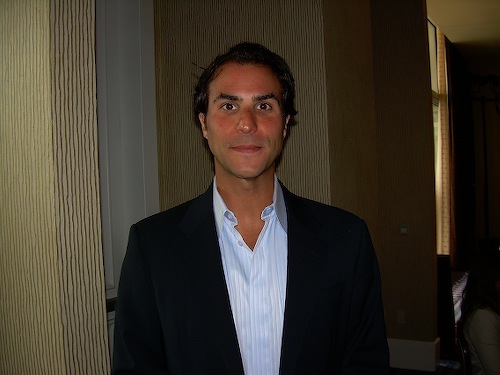What makes NBC's Big Ben tick? For one thing, using NBC shows as "integral pieces of marketing platforms"
11/18/08 04:00 PM

By ED BARK
As a network programmer, NBC Entertainment/Universal Media Studios co-chairman Ben Silverman could use a good deal of de-programming.
You know, strap him to a chair and pry his eyeballs open a la A Clockwork Orange. Then make him watch every episode of his network's junky Knight Rider series and others being used as "integral pieces of marketing platforms."
Silverman, interviewed none too aggressively on Monday's Charlie Rose show, exudes the scary confidence of a con man who actually believes he can sell quicksand in the Mojave. He had a rapt and agreeable listener in PBS's Rose, who unfortunately made even Larry King seem like Mike Wallace in his prime.
To hear Silverman tell it, No. 4 NBC is dominating the prime-time landscape in every which way imaginable. Not only that, the network is ingeniously integrating advertising into programming content in ways that will leave its rivals selling pencils on Sunset Boulevard.
Rose began their meeting of the minds with clips from NBC's Knight Rider, Kath & Kim, Biggest Loser, The Office and 30 Rock.
"Clearly the comedies are performing incredibly well," Silverman then told Rose.
Actually, they're not, although it'd be great if 30 Rock and The Office indeed did much, much better. They in fact are great shows. Left unsaid and unasked, though, is the fact that both comedies are far too smart and independent-minded to participate in the game Silverman is playing with his network's Knight Rider remake.
Its hero, Michael Knight, drives a Ford Shelby GT500KR in compliance with NBC's agreement with the Ford Motor Company. The Peacock had a like-minded arrangement between General Motors and My Own Worst Enemy, but alas the show has been canceled while GM's own fate hangs in the balance. Not surprisingly, Silverman and Rose didn't mention that little bit of business.
"Basically I'm getting 'disintermediated' from my audience via technology," Silverman explained while possibly creating a new brand of network-exec speak, too. "Digital and the delivery of our programming via digital distribution is giving my consumer the power to freeze-frame, fast-forward or watch at their own discretion. And therefore potentially skip the ads that are sold around the shows."
The "old school" way of production integration would be to brand the water glass in front of him, Silverman told Rose. In other words, do what American Idol has been doing pretty successfully with Coke since the show's inception.
But NBC supposedly has a better idea. It's using some of its new shows as "integral pieces of marketing platforms."
Advertisers "absolutely don't take a producing role," Silverman explained. "But they take on a role on how they'd like their car presented, but also the story they'd like to tell around their car."
That kind of sounds like producing the show. But no, said Silverman. It's merely "starting to think about the shows as promotional platforms, and almost as the new 30-second or 60-second spot (commercial)."
Great. Were Hill Street Blues in Silverman's hands, partners Andy Renko and Bobby Hill might well have driven their GM squad car to an off-duty charitable function that would make both them and their vehicle seem civic-minded. Or maybe the two officers might have raved about how they still had half-a-tank of gas after chasing crooks at high speed for a full day. Because GM, after all, gives you more oomph at the pump.
Rose drank all of this in without ever asking whether such integration might compromise a show's integrity. Or whether any producer with an ounce of integrity would allow such tampering. He laughed it up, though, after Silverman got off a good line on why it's difficult for youtube to get advertiser support.
"Because that same image is next to a cat peeing in a toilet," Silverman cracked.
As noted repeatedly in these spaces, NBC and Fox had the very good idea of partnering up to create hulu.com, which offers free access to clips and full episodes of their shows with comparatively few commercial interruptions.
But Silverman is really scary when talking about his visions of network programming. He may think it's outdated to measure a show's worth by how many people watch it on their television sets at the appointed hours. And clearly that can't be the only barometer anymore.
Still, ask NBC stations, including D-FW's KXAS-TV, about how thrilled they are to be getting mostly ratings-starved 9 to 10 p.m. lead-in programming for their late night newscasts. Do you think the grunts are buying into Silverman's glee over how many viewers supposedly watch NBC shows on hulu.com or whenever or wherever they want?
Meanwhile, CBS is thriving in the prime-time Nielsens and giving its stations' late night newscasts a ratings leg-up on almost every night of the week. You think they aren't a helluva lot happier?
Charlie Rose, who also works for CBS' 60 Minutes, seemingly doesn't know the difference. He just seemed happy to bask in the presence of a telegenic, supposedly hot-shot programming exec who told him that NBC is in the futuristic driver's seat with shows such as Knight Rider.
That's the same Knight Rider that finished 69th in the latest weekly Nielsen ratings with 5.34 million viewers. That put it right behind the Wednesday and Monday episodes of Univision's Fuego En La Sangre, which respectively drew 5.54 million and 5.46 million viewers.
Way to go, NBC.
